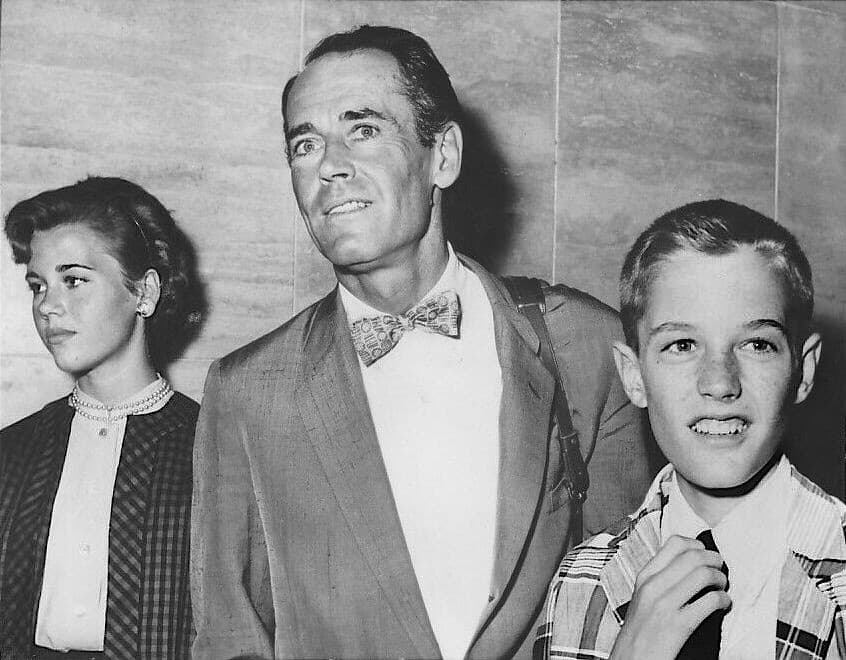‘The Tin Star,’ Anthony Mann’s ‘Timeless Western,’ Enters the Blu-ray Era
While this isn’t an A-movie — particularly when compared to the spate of pictures Mann made during the 1950s — and it isn’t the best forum for the talents involved, each of those talents gives his, and her, all.

‘The Tin Star’
Limited Edition Blu-ray
Arrow Video
Is it just me, or did Henry Fonda never look quite as handsome, as rugged and virile, as he’s seen in “The Tin Star” (1957)? When we initially encounter Fonda’s character, bounty hunter Morgan Hickman, he’s some combination of sunburnt and grimy, with each crag of his 52-year-old face given emphasis and definition. That he comes equipped with dialogue as pithy as a bumper-sticker and infinitely more pointed increases his magnetism. A limited edition Blu-ray package of director Anthony Mann’s “timeless Western” is now available.
Can one detect within Hickman the seed of Fonda’s turn as Frank, the villain of Sergio Leone’s “Once Upon a Time in the West” (1968)? Hickman rides into town with a corpse in tow, being a firm believer that outlaws are better brought to justice dead than alive. The local townsfolk don’t much cotton to this outsider and his mercenary ways. Hickman makes it plain he’s in it for the money. Once the payout arrives, he’ll be on his way.
A bucolic place, this unnamed outpost of civilization: though the streets are dusty, the citizens take pride in maintaining their homes, businesses, and gardens. Granted, the new sheriff, Ben Owens (Anthony Perkins), is a mite green and eager to prove himself a legitimate lawman. His gal Millie (Mary Webster) isn’t keen on Ben being sheriff, given that her father was the previous holder of that office and met his demise in the line of duty. The town doctor, Joseph J. “Doc” McCord (John McIntire), has hopes for the couple all the same.
The glitch in this sunny setting is Bart Bogardus (Neville Brand); he’s a bully, a racist, and a dab hand at organizing lynch mobs. Things become glitchier when Ed McGaffey (Lee Van Cleef) and his brother Zeke (Peter Baldwin) are implicated in the robbery of a stagecoach and two attendant murders. Sheriff Owens is adamant that the men be captured and brought to town for a fair trial. Bogardus, ever belligerent, thinks otherwise. Hickman, a former lawman and full-time cynic, takes it all in with a jaundiced eye.
Mann, working from a terse script by Dudley Nichols, brings his A-game to the proceedings, endowing it with a fluidity that never shortchanges the telling detail. The thing is, “The Tin Star” isn’t an A-movie — particularly when compared to the spate of pictures Mann made during the same decade. A proponent of the so-called psychological Western, Mann was on a streak during the 1950s. Consider the output: “The Furies” (1950), “Winchester ’73” (1950), “The Naked Spur” (1953), “The Far Country” (1954), “The Man From Laramie” (1955), and the epochal “Man of the West” (1958). A workhorse, our man Anthony; a master, as well.
“The Tin Star” is more conservative in its reach. Once Hickman comes across Kip (Michael Ray) and his mother Nona Mayfield (Betsy Palmer), we intuit that Mann isn’t out to complicate Fonda’s cinematic persona the way he did with Jimmy Stewart. Although Hickman remains gruff throughout, he’s got a soft spot for Kip and Nona, who not only brews a good cup of coffee but is soft on the eyes. Eventually, Hickman signs on to tutor Owens in the ways of handling a gun, negotiating with an adversary, and the most appropriate libation to order from the barkeep before 5 p.m.
If you guessed that Owens teaches a lesson of one sort or another to Hickman as well, then you know “The Tin Star” is a by-the-book Western. It is also an essay on the rewards of a job well done. While the film isn’t the best forum for the talents involved, each of those talents gives his all.
Did I say “his”? A highlight of this picture is Betsy Palmer, an undersung actress who is likely best known for her stint as a panelist on the early game show “I’ve Got a Secret.” She fills out a fairly generic role with a welcome sense of gravity and a hint of acerbity. Palmer adds a welcome sense of grounding to a modest and expert entertainment.

